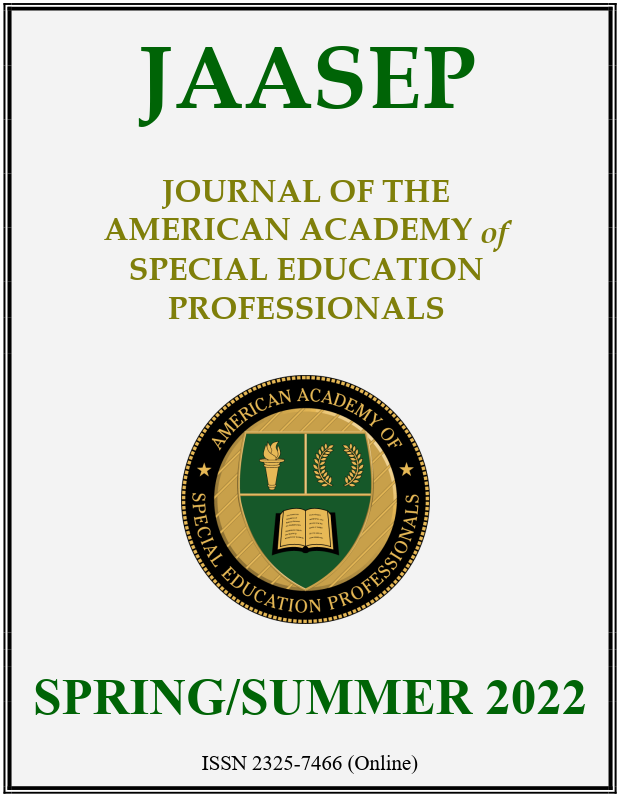Transforming the Narrative Identity of a Student with Extensive Support Needs Using Multiliteracies
Black, R. (2006). Language, culture, and identity in online fanfiction. E-Learning and Digital Media, 3, 170-184. https://doi.org/10.2304/elea.2006.3.2.170 DOI: https://doi.org/10.2304/elea.2006.3.2.170
Blackburn, M. V. (2005). Co-constructing space for literacy and identity work with LGBTQ youth. Afterschool Matters, 4, 17-23.
Blackburn, M. V., Clark, C. T., Kenney, L. M., & Smith, J. M. (2009). Acting out! Combating homophobia through teacher activism. Practitioner inquiry series. Teachers College Press. 1234 Amsterdam Avenue, New York, NY 10027.
Charmaz, K. (2014). Constructing grounded theory. Sage.
Collins, K. M. (2011). "" My mom says I'm really creative!"": Dis/ability, positioning, and resistance in multimodal instructional contexts. Language Arts, 88, 409-418. DOI: https://doi.org/10.58680/la201116262
Cope, B., & Kalantzis, M. (2009). “Multiliteracies”: new literacies, new learning. Pedagogies: An International Journal, 4, 164-195. DOI: https://doi.org/10.1080/15544800903076044
Cope, B., & Kalantzis, M. (2015). The things you do to know: An introduction to the pedagogy of multiliteracies. In A Pedagogy of Multiliteracies (pp. 1-36). Palgrave Macmillan. Cummins, J., & Early, M. (Eds). (2011). Identity texts. Institute of Education Press Duke, N. K., Purcell‐Gates, V., Hall, L. A., & Tower, C. (2006). Authentic literacy activities for developing comprehension and writing. The Reading Teacher, 60, 344-355. https://doi.org/10.1598/RT.60.4.4 DOI: https://doi.org/10.1598/RT.60.4.4
Early, M., & Gunderson, L. (1993). Linking home, school and community language learning. TESL Canada Journal 11(1), 99-111. https://doi.org/10.18806/tesl.v11i1.627 DOI: https://doi.org/10.18806/tesl.v11i1.627
Fránquiz, M. E., Salazar, M. D. C., & DeNicolo, C. P. (2011). Challenging majoritarian tales: Portraits of bilingual teachers deconstructing deficit views of bilingual learners. Bilingual Research Journal, 34, 279-300. https://doi.org/10.1080/15235882.2011.625884 DOI: https://doi.org/10.1080/15235882.2011.625884
Gee, J. P. (2016). Chapter 3: identity as an analytic lens for research in education. Review of Research in Education, 25(1), 99–125. https://doi.org/10.3102/0091732x025001099 DOI: https://doi.org/10.3102/0091732X025001099
Glaser, B. (2017). Discovery of grounded theory: Strategies for qualitative research. Routledge. DOI: https://doi.org/10.4324/9780203793206
Held, M. F., Thoma, C. A., & Thomas, K. (2004). 'The John Jones Show': How one teacher facilitated self-determined transition planning for a young man with autism. Focus on Autism and Other Developmental Disabilities, 19, 177-188. https://doi.org/101177/10883576040190030501 DOI: https://doi.org/10.1177/10883576040190030501
Holland, D. C., Lachiotte, W., Skinner, D., & Cain, C. (1998). Identity and agency in cultural worlds. Harvard University Press, 1998.
Kliewer, C. (2008). Seeing all kids as readers: A new vision for literacy in the inclusive early childhood classroom. Paul H. Brookes Pub..
Kliewer, C., & Biklen, D. (2001). “School's not really a place for reading”: A research synthesis of the literate lives of students with severe disabilities. Journal of the Association for Persons with Severe Handicaps, 26, 1-12. DOI: https://doi.org/10.2511/rpsd.26.1.1
Koppenhaver, D. A., Erickson, K. A., & Skotko, B. G. (2001). Supporting communication of girls with Rett syndrome and their mothers in storybook reading. International Journal of Disability, Development and Education, 48, 395-410. https://doi.org/10.1080/10349120120094284 DOI: https://doi.org/10.1080/10349120120094284
Kress, G. (2000). Multimodality. In B. Cope & M. Kalantzis (Eds.), Multiliteracies: Literacy learning and the design of social futures (pp. 182-202). Routledge.
Leander, K. M., & Lovvorn, J. F. (2006). Literacy networks: Following the circulation of texts, bodies, and objects in the schooling and online gaming of one youth. Cognition and Instruction, 24, 291-340. https://doi.org/10.1207/s1532690xci24031 DOI: https://doi.org/10.1207/s1532690xci2403_1
Lovitt, T.C., Cushing, S. S., & Stump, C. S. (1994). High school students rate their lEPs: Low opinions and lack of ownership. Intervention in School and Clinic, 30, 34-37. https://doi.org/10.1177/105345129403000106 DOI: https://doi.org/10.1177/105345129403000106
Merriam, S. B. (2007). Qualitative research and case study applications in education. Jossey-Bass Publishers.
Morrell, E. (2008). Critical research and the future of literacy education. Journal of Adolescent & Adult Literacy, 53, 96-104. https://doi.org/10.1598/JAAL.53.2.1 DOI: https://doi.org/10.1598/JAAL.53.2.1
Rowsell, J., & Pahl, K. (2007). Sedimented Identities in Texts: Instances of Practice. Reading Research Quarterly, 42, 388-404. Retrieved from http://www.jstor.org/stable/20068302 DOI: https://doi.org/10.1598/RRQ.42.3.3
Sfard, A., & Prusak, A. (2005). Telling identities: In search of an analytic tool for investigating learning as a culturally shaped activity. Educational Researcher, 34(4), 14-22. https://doi.org/10.3102/0013189X034004014 DOI: https://doi.org/10.3102/0013189X034004014
The New London Group. (1996). A pedagogy of multiliteracies: Designing social futures. Harvard educational review, 66, 60-93. DOI: https://doi.org/10.17763/haer.66.1.17370n67v22j160u
Downloads
Article Information
- Article Type Articles
- Submitted May 12, 2022
- Published June 15, 2022
- Issue Spring/Summer 2022
- Section Articles
